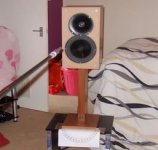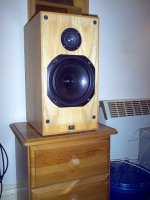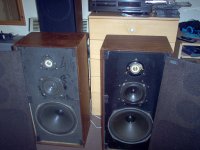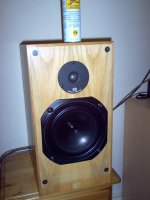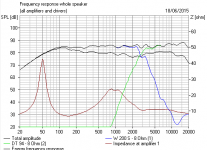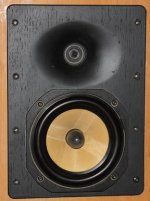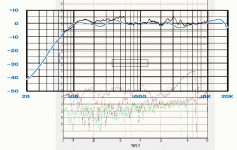An externally hosted image should be here but it was not working when we last tested it.
I noticed over at avsforum that Mackie is selling a high-efficiency two-way for under $200.
It's using the very nice Celestion CDX1-1445 on a waveguide that looks a lot like an OS waveguide.
I haven't personally heard it, but I've heard similar designs from QSC, and they're remarkably hifi.
Might be worth a look if you want some high efficiency goodness, but you don't want to spend $2000
There is a bit of a formula for the bass and waveguide tweeter array IMO. 🙂
Perhaps our goodly Doctor Earl Geddes is saying "I told you so!" But we haven't got as far as his foam damping of the horn yet. 😀
Even Troels is jumping on the bandwagon:
TQWT-
And our own Matt in Cheltenham shows off his Vifa M21 pride and joy below. Me, on the right, I just do cheap cone tweeters and lively bass, which go some way to match dispersion and dynamics. I mean, I can solder, but not very talented at the rest of the technology! We are all toilers in the same high efficiency vinyard in the end. 😱
Perhaps our goodly Doctor Earl Geddes is saying "I told you so!" But we haven't got as far as his foam damping of the horn yet. 😀
Even Troels is jumping on the bandwagon:
TQWT-
And our own Matt in Cheltenham shows off his Vifa M21 pride and joy below. Me, on the right, I just do cheap cone tweeters and lively bass, which go some way to match dispersion and dynamics. I mean, I can solder, but not very talented at the rest of the technology! We are all toilers in the same high efficiency vinyard in the end. 😱
Attachments
What are you trying to say?There is a bit of a formula for the bass and waveguide tweeter array IMO. 🙂
Pretty straightforward, Allen B. 🙂
When you transistion from an 8" bass to a 1" dome tweeter, as in the Audio Note AN-E, whatever it's other strengths might be, you hear the dispersion transistion from a narrowing dispersion 8" bass to a widely dispersing 1" tweeter. It has the effect of making the top end sound overly bright. It's in the secondmost ignored, after phase, effect of overall power response.
Three-ways tend to have excellent power dispersion. As in my Celestion Ditton 44 below. Once you limit yourself to two-ways, the dip in power response becomes audible around 3kHz with 1" tweeter, illustrated below including approximate power response. A waveguide tweeter however matches up better on dispersion than flat baffle 8" plus 1" solution. Currently I'm also trying flatter power response BW3 and 2" cone tweeter to solve this.
It's cheaper than waveguides. 😱
When you transistion from an 8" bass to a 1" dome tweeter, as in the Audio Note AN-E, whatever it's other strengths might be, you hear the dispersion transistion from a narrowing dispersion 8" bass to a widely dispersing 1" tweeter. It has the effect of making the top end sound overly bright. It's in the secondmost ignored, after phase, effect of overall power response.
TQWT-DTQWT-T35C002Troels Gravesen said:Making a seamless integration of an 8" driver and a dome tweeter is the trick, regardless of being a 1" or 1½". The T35 - as is - can easily handle the treble range down to even 1.5 kHz from a LR2 filter - and it was tried and it didn't sound right. No matter what, the treble stood out and the T35 just kept calling: Here I am! And it wasn't due to point of crossover, slopes or levels, but due to the transition in dispersion from a large 8" driver to a small dome. It didn't produce the coherent sound of the TQWT and DTQWT speakers fitted with the TW034/waveguide.
Three-ways tend to have excellent power dispersion. As in my Celestion Ditton 44 below. Once you limit yourself to two-ways, the dip in power response becomes audible around 3kHz with 1" tweeter, illustrated below including approximate power response. A waveguide tweeter however matches up better on dispersion than flat baffle 8" plus 1" solution. Currently I'm also trying flatter power response BW3 and 2" cone tweeter to solve this.
It's cheaper than waveguides. 😱
Attachments
system7
How poor can you bloody get ?
those pictures dont deserve the paper they are printet on.
How much did they cost exactly ?
How poor can you bloody get ?
those pictures dont deserve the paper they are printet on.
How much did they cost exactly ?
I've heard a similar speaker to this one in a music shop (instruments). Good for the price.
I used to run domes down to 1500 to match a 6.5" back in the day. Apart from the issues with that I also don't like 180 degree dispersion that high.
Steve, I can't say as my horns cost me much. I'm a bit like PB that way except I prefer to work with wood than fibreglass. I appreciate that we sometimes like going one way or another to meet a challenge.
I used to run domes down to 1500 to match a 6.5" back in the day. Apart from the issues with that I also don't like 180 degree dispersion that high.
Steve, I can't say as my horns cost me much. I'm a bit like PB that way except I prefer to work with wood than fibreglass. I appreciate that we sometimes like going one way or another to meet a challenge.
Well, AllenB, you and I are old enough to remember our late, great old moderator Lars Dyreborg, aka Tinitus.
It was his idea that a ring radiator (the Vifa XT25, below) worked well enough at the centre of a waveguide to produce a good sound.
Possibly better than a soft-dome? I leave it for you to decide. As it goes, Troels thought a JBL cone tweeter worked well too. 🙂
Time for bed in the UK. 😱
It was his idea that a ring radiator (the Vifa XT25, below) worked well enough at the centre of a waveguide to produce a good sound.
Possibly better than a soft-dome? I leave it for you to decide. As it goes, Troels thought a JBL cone tweeter worked well too. 🙂
Time for bed in the UK. 😱
Attachments
Earl once said that ring radiators made sense (could have had reservations though).
An elliptical waveguide on a flat baffle is a negative thing as I see it. Take a ribbon tweeter as an example, tall for narrow vertical directivity. A WG is not only taller but longer, so narrowing one behind a flat baffle increases the needed crossover frequency and increases dispersion below this point.
The Mackie shown above gets wide (shallow) at the edges which is a better way to deal with it's limited space.
Night.
An elliptical waveguide on a flat baffle is a negative thing as I see it. Take a ribbon tweeter as an example, tall for narrow vertical directivity. A WG is not only taller but longer, so narrowing one behind a flat baffle increases the needed crossover frequency and increases dispersion below this point.
The Mackie shown above gets wide (shallow) at the edges which is a better way to deal with it's limited space.
Night.
An externally hosted image should be here but it was not working when we last tested it.
I noticed over at avsforum that Mackie is selling a high-efficiency two-way for under $200. --- Might be worth a look if you want some high efficiency goodness, but you don't want to spend $2000
A diy gal/guy would easily make a heavier "hifi" box for those, preserving the faceplate. Behringer etc. have similar models too.
High efficiency on the cheap
is a 15" pro-papercone and a bullethorntweeter
on top of an open baffle.
Put it up against a wall or in a corner.
turn it up and you will go deaf.
is a 15" pro-papercone and a bullethorntweeter
on top of an open baffle.
Put it up against a wall or in a corner.
turn it up and you will go deaf.
I hear a lot of Mackie speakers at luaus around here. They can cover quite a lot of area at sufficent volume. By that I mean you can hear clearly the music, singing and speech over wide outdoor areas. Plenty of volume to hear all you need to hear, without strain.
I even started a thread on the subject a few years ago.
The Mackies are very pleasant sounding and not expensive. The QSC K8 is an amazing little powered speaker that works wonders. Not real cheap, tho.
It shows what can be done with good engineering and efficient, large quantity manufacturing. How much speaker do you really need?
I even started a thread on the subject a few years ago.
The Mackies are very pleasant sounding and not expensive. The QSC K8 is an amazing little powered speaker that works wonders. Not real cheap, tho.
It shows what can be done with good engineering and efficient, large quantity manufacturing. How much speaker do you really need?
- Status
- Not open for further replies.
- Home
- Loudspeakers
- Multi-Way
- Poor Man's High Efficiency Speaker.
